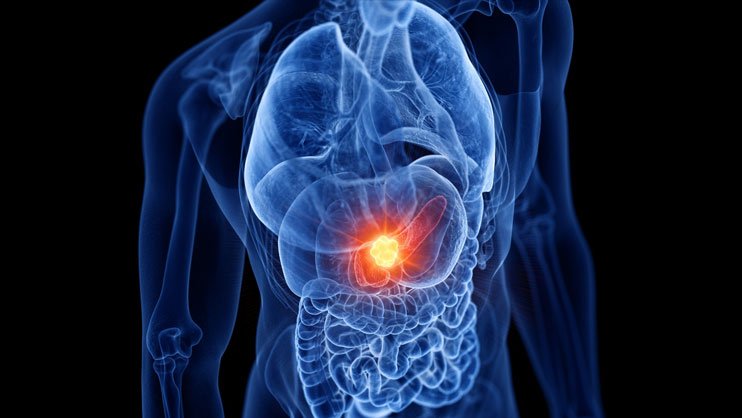One of the best doctor for Pancreas Cancer in Gurgaon
The pancreas is a gland that is shaped like a thin pear lying on its side. The wider end of the pancreas is called the head, the middle section is called the body, and the narrow end is called the tail. The pancreas lies with C loop of first part of small intestine called duodenum and situated between the stomach and the spine. Enzymes are released in pancreatic secretions which helps in digestion of food. It produces hormones which control blood sugar i.e., insulin and glucagon. Pancreatic cancer is a disease in which malignant (cancer) cells form in the tissues of the pancreas.

Types: most common type of pancreatic cancer arise from the duct cells called pancreatic ductal adenocarcinoma.
- ● Pancreatic Adenocarcinoma – 95%
● Periampullary carcinoma
● Adeosquamous/ Undifferentiated carcinoma
● Pancreatic Neuroendocrine Carcinoma/ Tumors
● Cystic Neoplasm of pancreas.
Risk Factors:
● Old Age
● Tobacco
● Heavy alcohol use
● Overweight/ Obesity
● Diabetes
● Chronic Pancreatitis
● Family History
● Red and processed meats (such as sausage and bacon), saturated fats, Sugary drinks may increase the risk of pancreatic cancer.
Genetic conditions:
● Multiple endocrine neoplasia type 1 (MEN1) syndrome.
● Hereditary nonpolyposis colon cancer (HNPCC; Lynch syndrome).
● Von Hippel-Lindau syndrome.
● Peutz-Jeghers syndrome.
● Hereditary breast and ovarian cancer syndrome.
● Familial atypical multiple mole melanoma (FAMMM) syndrome.
● Ataxia-telangiectasia.
Alarming Signs:
Initial symptoms of pancreatic cancer are usually not present. In 80% of cases disease has
already present in advance stages. Because of late presentation and highly aggressive nature,
pancreatic cancer has high mortality rate.
● Abdomen/ back pain
● Yellowish discoloration of body and secretions called jaundice. It is present in
around 70% of cases.
● low appetite and weight loss
● pale gray or fatty stool/ Dark colored urine
● nausea and vomiting
● Unexplained weight loss/ Loss of appetite/ fatigue
● diarrhea or constipation
● Indigestion
● Rarely a new onset diabetes
● Itching due to jaundice
Investigations:
● CECT/ MRI/ PET CECT scan: to get a complete and detailed extent of disease within
and outside pancreas
● Endoscopic ultrasound (EUS)/ Upper GI Endoscopy: get images of pancreas and biopsy
can be done. When jaundice is very high or patient not suitable for Surgery ERCP+
stenting is done,.
● Tumor marker: CA 19-9
Stages:
● I: Disease localized within pancreas.
● II: The cancer has reached the bile duct and other structures but not the lymph nodes.
● III: The cancer affects the lymph nodes.
● IV: The cancer has reached other organs of the body like liver, lung.
Treatment:
Surgery: When cancer is localized in pancreas, it is possible to eliminate the cancer cells
by removing all or part of the pancreas. Surgery is the only curative option available for
pancreatic cancer.
The three main surgical procedures for pancreatic cancer are:
● Whipple procedure/ Pancreaticoduodenectomy: Portion of disease bearing
pancreatic head, along with a portion of the stomach, duodenum, bile duct and
lymph nodes are excised with anastomosis to restore normal passage.
● Distal pancreatectomy: Disease bearing last part of the pancreas and usually
spleen are removed.
● Total pancreatectomy: rarely done surgery, entire pancreas and spleen are
removed. Post pancreatectomy diabetes may develop.
Palliative surgery: Palliative surgery can help relieve symptoms such as obstructions in
the bile duct or duodenum. Bypass so that bile can continue to flow from the liver-
Hepaticojejunostomy. Another option is to insert a small stent in the bile duct to keep it
open. This is a less invasive procedure using an endoscope. Palliative Gastrojejunostomy
to relieve stomach obstruction is also required in some cases.
Chemotherapy: Given as adjuvant treatement after aurgery in advance cases, sometimes
as Neoadjuvant treatment. In advance metastatic cases palliative chemotherapy is givem
Targeted therapy: There are different types of targeted therapy, such as:
● EGFR inhibitors, which block the EGFR protein
● PARP inhibitors, which block PARP enzymes
● NTRK inhibitors
These drugs hit specific targets, so side effects are less.
Immunotherapy: It helps the body’s immune system to recognize and kill cancer cells.
PD-1/ PDL 1 inhibitors are type of immunotherapy against pancreatic cancer.
Radiation therapy: High energy rays are given on the cancer cells. May given before
surgery in borderline operable cases or after surgery in advance cases. May be an option
in localized disease when patient is not fit enough to undergo surgery.
Prognosis: 5 years survival is 39% when it is localized,13% when it is regional and 3% when
distant disease.
Prevention:
● Avoid tobacco and alcohol
● Maintaining a moderate weight
● Daily physical activity
● Fresh fruits and vegetables
● Avoid red/ processed meat
How to contant one of the best doctor for Pancreas Cancer treatment in Gurgaon…
Book an AppointmentWhat Our Patients Say
Frequently Asked Questions
For patients who are diagnosed before the tumor grows or spreads, the average pancreatic cancer survival time is 3 to 3.5 years. Contact Cancer Surgery Gurugram surgery gurugram for pancreas cancer treatment in Gurgaon.
There is a cure for pancreatic cancer if it is caught early. Two types of surgery, the Whipple procedure or a pancreatitis, can remove part or all of the pancreas. This will eliminate the initial cancerous tumor. Contact Cancer Surgery Gurugram surgery gurugram for pancreas cancer treatment in Gurgaon.
Best Doctor for Pancreas Cancer in Gurgaon says Cigarette smoking (responsible for about 25% of pancreatic cancer) alcohol abuse. Regular intake of high dietary fat. Obesity (obese people are 20% more likely to develop pancreatic cancer than non-obese people)
According to the best Doctor for Pancreas Cancer in Gurgaon Chronic pancreatitis, pancreatic cancer, pancreatic duct obstruction or cystic fibrosis can also make your stool yellow. These conditions prevent your pancreas from providing sufficient amounts of enzymes needed to digest your food.

